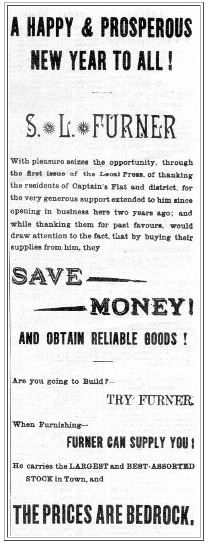A Post Office was founded in April 1883 and Captain's Flat, as a town, was alive. New shops were opened by F. Bennison and G. Darker, T. Daly opened a blacksmith and C. Newman a timber yard. John Harrison converted his property, Yorkdale, into a boarding house but he died less than a month later.
By 1886 some 200 acres of Crown Land was mapped out for the town's growth and in 1888, Captain's Flat was officially made a town. Captain's Flat was well and truly up and running. By the 1890's the town had five hotels and six general stores.
But Captain's Flat was nevertheless, a wild mining town. The owner of the Silver Age Hotel was forced to use a pistol to clear patrons from his bar during a riot where the manager of Koh-i-noor Mine was severely beaten. The wife of another hotelier fell through an open trapdoor while serving drinkers, luckily she escaped serious injury. Perhaps the best known hotel of the times was the Captain's Flat Hotel, owned by Mrs. Mary Ann Goggin, who was a noted citizen of the town.
Mr. J. W. McDonagh started a general store in 1885 and Patrick Coffey opened his bakery in 1887 and he operated it for some ten years without competition. Mr. S. L. Furner opened another general store in the cntre of town and called it "the cheapest house in town", indeed, he even had that slogan painted across the roof. The town had grown so quickly that there was ample trade for both he and McDonagh and four more store proprietors as well. two coachlines were operating, the Donnelly and Petaers and the Tickler lines. By 1898 there were two dentists, three doctors, a chemist, blacksmith, jeweller/watchmaker, tailor, three hairdressers and several auctioneers. The town also boasted a medical hall, cordial factory, School of Arts, billiards halls, printer and a newspaper.
Most of the businesses congregated south of the Post Office. This area was known as Bogtown but Captain's Flat had four suburbs, the others being Bagtown, Newtown and Coppertown. Residents did not take kindly to the names and demanded Bagtown be called Oakvale and Bogtown called Paradise Alley. But the original names are the ones which stuck, even to this day.
The first official building erected was the Police Station in 1896. The town was still a typical mining town of the day, with the most patronised establishments being the hotels. Beer flowed freely and it is said that publicans turned the taps full on and left the beer flowing as the demand was such that to pour glasses of beer singly was simply too slow. The barmen wore gumboots and served drinkers who were packed tightly inside the bars. Conversely, the School of Arts had only forty odd members, the miners simply not interested in development of their minds through gentler pursuits. The courthouse was built in 1899 but residents complained about its size, claiming it was nothing more than a calf pen. Strangely, stock were impounded on the site over the years which was oddly prophetic.
No matter how hard upstanding citizens tried to improve the town, it remained a rather uncivilised place with children and youths roaming the streets, "skinny-dipping" in the river and exposing themselves to passersby. The first edition of the Mining Record claimed that "There are schools to educate; churches for spiritual welfare; stores; hotels and other places where all the necessities of life are supplied at very moderate and reasonable charges".
The locals had a local horse racing club, of rather dubious integrity with race fixing among jockeys apparently common. But it didn't seem to matter too much, the race days being well attended, with the horses racing along the Jerangle Road, it was easy for jockeys to swap horses while they were out of sight. Spectators sat under trees waiting for the horses to reappear, with the inevitable beer drinking being the main recreation. Football was also very popular with several teams being fielded in the town. But no matter what the sporting interest, the day was always ended with a social evening at the Goggins Hall.
But underlying Captain's Flat's seeming prosperity was a civic need for funds for the poor, and for the most important commodity... water. The government ignored the calls for funding to establish a decent water supply and the lack of basic services resulted in serious disease outbreaks, particularly typhoid. In 1899, money collected for a retiring mine manager, was used instead for the poor. Mining accidents were common with quite serious injuries happening every day, but there was still no hospital. The hospital was set up eventually, but by the time this happened, ore prices were down and the mines were closed.

